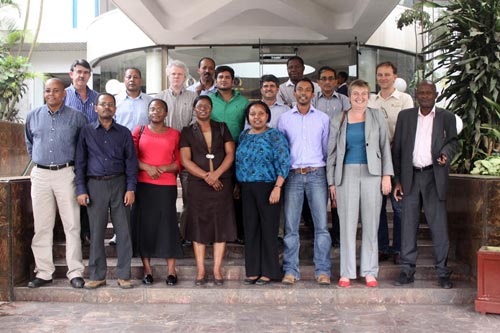 15 staff members from the Center for International Forestry Research (CIFOR) and CIMMYT participated in a four-day Leadership Development Program in Nairobi, Kenya, facilitated by Sharon Crabtree and Petr Kosina. The program was aimed at ensuring that leaders were aware of their individual competencies and job requirements, and focused on managerial styles which create a good organizational environment. The workshop activities included group exercises, personal reflection, coaching, and leadership theory.
15 staff members from the Center for International Forestry Research (CIFOR) and CIMMYT participated in a four-day Leadership Development Program in Nairobi, Kenya, facilitated by Sharon Crabtree and Petr Kosina. The program was aimed at ensuring that leaders were aware of their individual competencies and job requirements, and focused on managerial styles which create a good organizational environment. The workshop activities included group exercises, personal reflection, coaching, and leadership theory.
Drawn from different countries, participants analyzed diverse learning and leadership styles, and the type of organizational climate they create.
Prior to the workshop, they participated in a 360-degree evaluation of leadership competencies, where they evaluated themselves and had their team members evaluate them. The emphasis was on what resonated with the team. “Even though we all have our deficiencies in leadership, we should maximize what we do better,” said Isaiah Nyagumbo, a scientist in the Conservation Agriculture Program reflecting on some of the key lessons from the program. “Often our eyes are open but we do not see,” added Arun K. Joshi, South Asia Regional Coordinator of the Global Wheat Program. “The ideas were not just cut and paste, it is based on research. Thus it is very professional using scientific methods and tools that bring to us the facts.”
Phosiso Sola, CIFOR’s Regional Coordinator for East and Southern Africa, found the program broke down the issues, making them easier to digest. “However, there is a need for follow-up coaching to support the leaders in making the changes they committed to at the end of the program,” she commented on the challenges of the program. Sridhar Bhavani, a wheat breeder based in Nairobi, found it useful to know how people perceive him as a leader: “I was glad to take it [the leadership program] early in my career and feel it will be very useful in the long run.”
 Capacity development
Capacity development